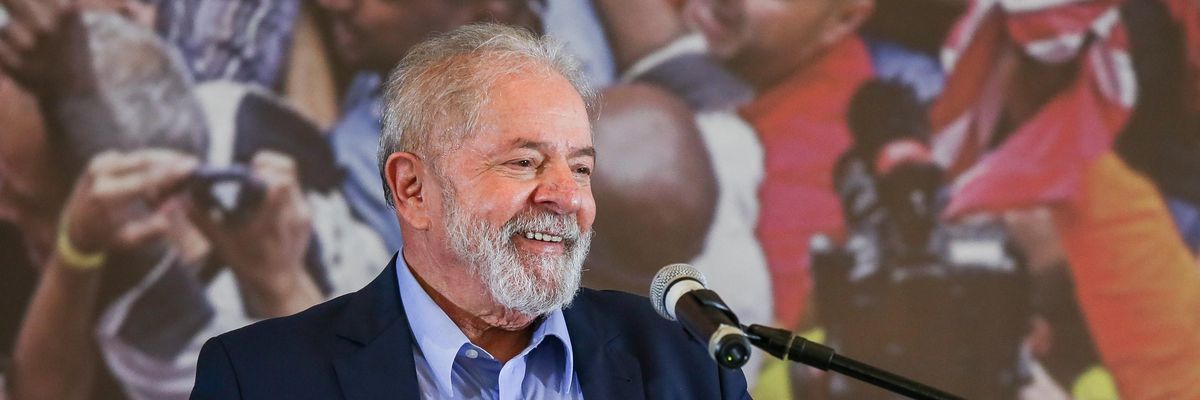Luiz Inacio Lula da Silva, a celebrated leftist who lifted millions out of poverty during his tenure as Brazil's president, continues to hold a substantial lead over far-right incumbent President Jair Bolsonaro, whose preemptive assault on the integrity of the nation's electronic voting system and refusal to commit to a peaceful transfer of power has led to heightened fears of political violence as the October election quickly approaches.
"There is good reason to fear a possible Brazilian January 6 kind of situation."
As Reutersreported Monday, a new poll by IPEC, formerly known as IBOPE, found that 44% of voters would support Lula in the first round of the election--scheduled for October 2--giving him a 12-point lead over Bolsonaro, who garnered 32%.
Should the two candidates meet in a head-to-head runoff on October 30 as expected, Lula would beat Bolsonaro by a margin of 51% to 35%, said the polling firm, which conducted in-person interviews with 2,000 voters between August 12 and August 14.
Although Lula's lead in the polls has declined from 26% in December to 18% in July, according to Datafolha, another major polling outfit, he still has a 20-point advantage over Bolsonaro in the likely event of a runoff, which occurs when no candidate wins more than 50% of the first-round ballots.
"Bolsonaro has increased spending on welfare for poor Brazilians, which may be improving his numbers," Reuters reported. "He has also pressed state-controlled oil company Petrobras to lower the price of fuel, a big factor in pushing up inflation."
Facebook's massive failure to combat disinformation about the upcoming presidential, congressional, and gubernatorial elections could be another factor contributing to Bolsonaro's slight upward trend in recent weeks.
Pro-democracy watchdog group Global Witness revealed Monday that the popular social media platform did not flag any of its 10 test ads encouraging users to vote on the wrong day, promoting outdated voting methods no longer in use, and spreading baseless claims of fraud that echo what Bolsonaro--taking a cue from former U.S. President Donald Trump--has repeated for months to cast doubt on his projected loss.
Related Content
Facebook 'Appallingly Failed' to Detect Election Misinformation in Brazil, Says Democracy Watchdog
Julia Conley
Reuters noted that "the IPEC poll said Bolsonaro's approval rating is at 29%, compared to just 19% in December, while the number of voters who see his government as bad or terrible has dropped to 43% from 55% in the previous survey."
"Still, 57% of Brazilians disapprove of the way Bolsonaro, a former army captain and right-wing firebrand, governs the country, while only 37% approve," the news outlet added, citing IPEC.
While recent telephone surveys conducted by Quaest found that Bolsonaro is now statistically tied with Lula in Sao Paulo and has narrowed his progressive opponent's lead in Minas Gerais--the country's two largest states--other new data published Monday shows that Lula is no longer ceding ground and has over the past week resumed gains in support.
The latest polling results come amid increasingly anti-democratic rhetoric from Bolsonaro and violent actions from his supporters--an escalation that observers fear could suppress turnout or culminate in a coup attempt if the incumbent is defeated.
In recent weeks, Bolsonaro has ordered military personnel "to monitor the source code used in more than half a million ballot boxes," The Guardianreported Tuesday. "His supporters have attacked two Lula rallies in recent weeks, throwing feces, urine, and a crude explosive device at Lula backers, as well as shooting dead one prominent Workers' Party official in the western city of Foz de Iguacu."
Pablo Nunes, head of the CESeC think tank, told the newspaper that "there is good reason to fear a possible Brazilian January 6 kind of situation. The conditions are there for this to happen."
The Guardian noted that "although Bolsonaro has the backing of many in the military, it is unclear whether the top brass would support any attempt to subvert the democratic process."
But that's not stopping Bolsonaro from drumming up as much support as possible for a right-wing insurrection.
"Buy your guns! It's in the Bible!" the president told agricultural leaders last week.
According to Felipe Borba, the coordinator of a political violence think tank at Rio de Janeiro's leading university, "He is doing it to focus attention away from the country's real problems and frighten the opposition, as well as to keep his militant base charged."
"It's also done to prepare his side for a violent reaction if they lose," said Borba.
Supporters of Lula and popular governance, meanwhile, have been reiterating the need to protect fair elections and respect their outcomes, with more than 800,000 Brazilians signing a pro-democracy manifesto one week ago.
Tens of thousands of people hit the streets in cities across Brazil last Thursday to demonstrate against Bolsonaro's coup-mongering and to defend democracy against the neo-fascist forces seeking to reimpose a dictatorship in the South American nation.
Related Content
'Dictatorship Never Again': Massive Pro-Democracy Protests Sweep Brazil
Brett Wilkins
During a May speech in Sao Paulo marking the official launch of his campaign to unseat Bolsonaro, Lula said, "Everything that we did is being destroyed by this government."
As Brazil's president from 2003 to 2010, Lula--a member of the Workers' Party who began his political career in the 1970s as a metalworkers union organizer--oversaw a sustained period of economic growth, which he channeled into downwardly redistributive programs that curbed inequality.
Lula enjoyed approval ratings of over 80% when he left office, and before his candidacy was upended by a corruption conviction, he was leading the polls during the 2018 contest eventually won by Bolsonaro. Lula has maintained his innocence, characterizing the charges that led to his 18-month incarceration as a lie fabricated by right-wing operatives intent on pulling off a political coup.
During his three-plus years at the helm, by contrast, Bolsonaro has intensified the destruction of the Amazon rainforest--endangering the future of the planet--and responded so poorly to the ongoing Covid-19 pandemic that Brazil's Congress has accused him of crimes against humanity.



